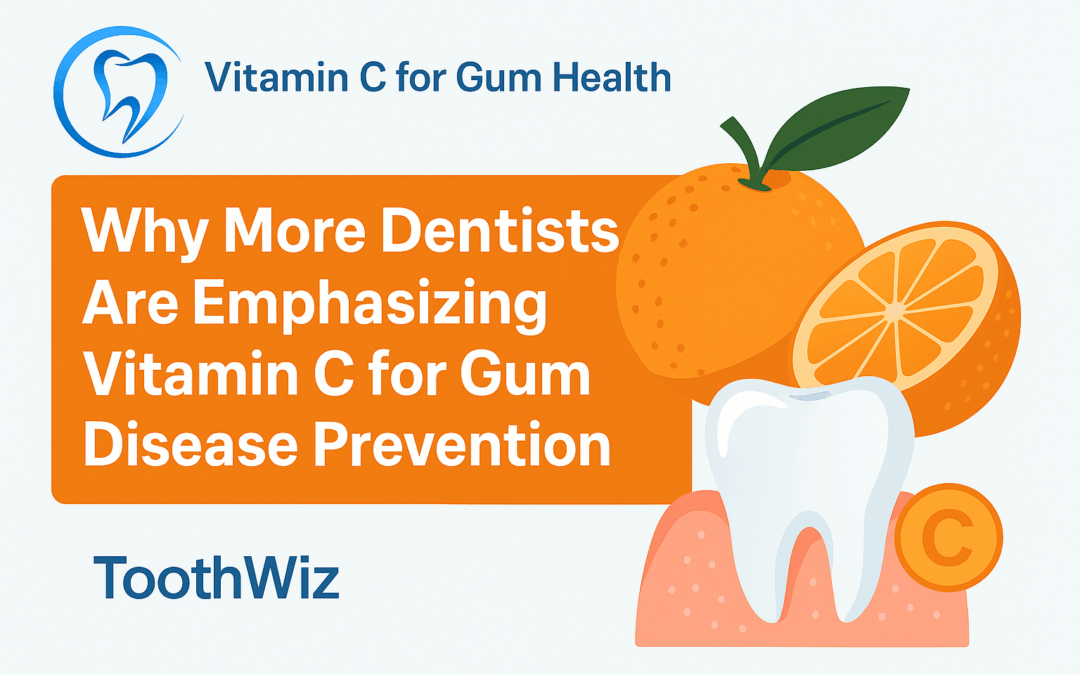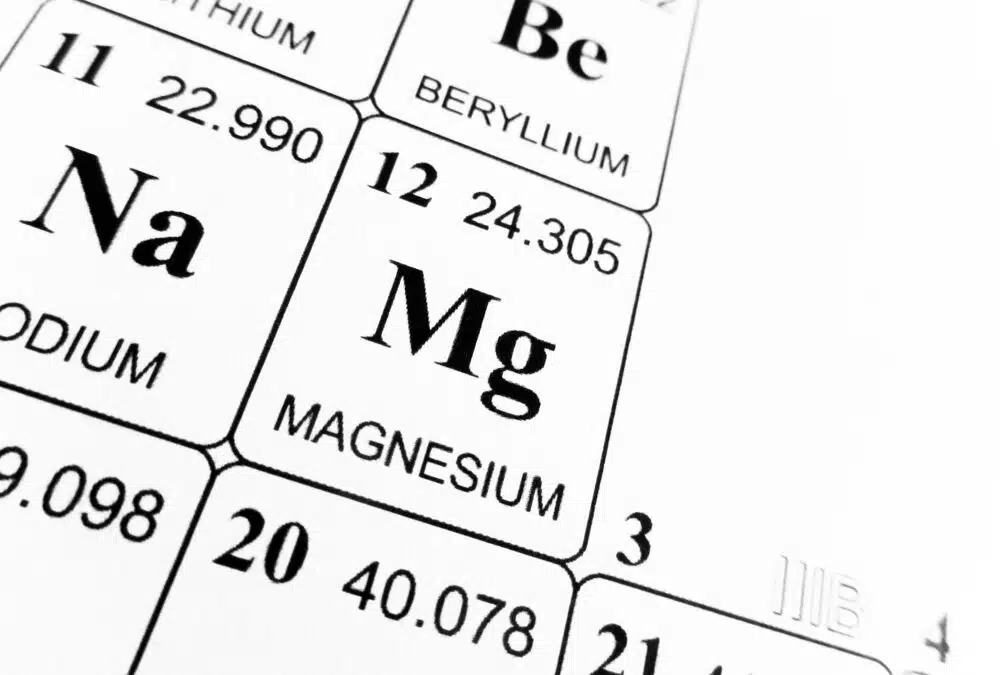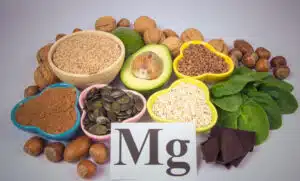
Why Dentists Recommend Vitamin C for Gum Disease
In recent years, a delightful trend has emerged in the dental community—dentists are no longer just frowning at sugary snacks; they’re beaming at the wonders of vitamin C for gum disease prevention! Yes, you heard that right. This powerhouse nutrient, often associated with keeping colds at bay, is stepping into the spotlight as a vital player in maintaining not only our overall health but also our precious gums. And let’s face it—who wouldn’t want to swap out an artificial mouthwash for something as natural and delicious as vitamin C-rich citrus fruits?
The connection between vitamin C and oral health is more profound than many realize. A study published in PubMed highlights that low plasma vitamin C levels are associated with an increased risk of periodontitis. This correlation underscores the importance of ensuring we maintain adequate levels of this essential nutrient. Think of vitamin C as your gums’ personal bodyguard, fighting off inflammation and boosting collagen production—two crucial elements for healthy gums. If you’ve been searching for natural solutions, vitamin C for gum disease is one of the most well-researched and accessible options.
The Magic of Ascorbic Acid for Gums
But what exactly makes ascorbic acid for gums so magical? When we think about vitamins, we often picture them just sitting in our supplements, doing nothing until needed. However, vitamin C actively works to:
- Reduce Gum Inflammation: Regular intake can significantly lower inflammation levels in gum tissue.
- Promote Collagen Production: This essential protein aids in repairing gum tissue and maintaining their integrity.
- Keeps Bleeding at Bay: An adequate supply can help prevent bleeding gums—a common sign of gingivitis.
Sipping on a refreshing glass of orange juice or munching on strawberries isn’t just a treat; it’s your sweet little secret to gum disease prevention with vitamin C! And while you’re indulging your taste buds, you’re also taking proactive steps toward better vitamin C periodontal health.
Nutritional Support for Gum Health
This holistic approach to oral hygiene advocates for a balanced diet rich in antioxidants that support healthy gums and teeth. Some excellent sources of vitamin C include:
- Citrus fruits (oranges, lemons)
- Berries (strawberries, blueberries)
- Kiwis
- Pineapples
- Bell peppers
You can elevate your gum care routine by integrating these vibrant foods into your diet while embracing preventive care strategies. Remember, when it comes to oral wellness, it’s not just about brushing or flossing—it’s about nourishing those beautiful smiles from within!
If you’re eager to dive deeper into the expansive world of dental health and unleash the potential benefits of high-dose vitamin C for gums, ToothWiz is here to guide you every step of the way. Together, let’s embark on this journey towards achieving that radiant smile through natural health solutions!
The Link Between Vitamin C and Oral Health
When it comes to oral health, the link between vitamin C and our gums is like a tightly woven tapestry—each thread playing an essential role in maintaining the structural integrity and functionality of our oral landscape. The role of vitamin C, or ascorbic acid, extends way beyond just warding off those pesky colds; it’s crucial for keeping our gums healthy and vibrant.
Research indicates that vitamin C is not only a formidable antioxidant but also plays a pivotal role in collagen synthesis. Collagen, often hailed as the building block of skin and connective tissues, is just as important for your gums. A study published in the Journal of Periodontology reveals that adequate levels of vitamin C significantly reduce gum inflammation—a common precursor to serious periodontal issues.
The Hidden Dangers of Vitamin C Deficiency
Let’s delve deeper into what happens when we skimp on vitamin C:
- Increased Risk of Gingivitis: Low levels can lead to swollen and bleeding gums, making you more susceptible to gingivitis.
- Delayed Healing: Insufficient vitamin C slows down the healing process after dental procedures or injuries.
- Poor Collagen Formation: Without enough vitamin C, collagen production falters, which may compromise gum tissue integrity.
The consequences are clear: neglecting your intake of this potent nutrient could lead to unwanted complications. So why not make a conscious effort to integrate more vitamin C into your daily diet? It’s an easy win!
Citrus Fruits and Beyond
You might be wondering where to find this magical nutrient. Look no further than your grocery store’s produce aisle! Here are some delicious sources:
- Citrus Fruits: Oranges, grapefruits, and lemons are fantastic options that pack a punch.
- Berries: Strawberries and blueberries not only taste great but also deliver an impressive dose of antioxidants.
- Kiwis and Pineapples: These tropical delights are rich in vitamin C and add a refreshing twist to your fruit salads!
The beauty lies in variety; mixing these fruits into smoothies or snacking on them can transform mundane routines into vibrant rituals that nourish your body from within. Imagine enjoying a fresh smoothie while knowing you’re doing wonders for your gum health! It’s like hitting two birds with one delicious stone!
A Gentle Reminder
If you’re looking for natural treatment for gum disease, remember that incorporating foods high in vitamin C isn’t just beneficial—it’s essential. While brushing and flossing remain critical components of oral hygiene, nurturing our bodies with vitamins enhances our overall wellness.
Your journey toward healthier gums filled with vitality starts today. By being mindful of what goes into your body and embracing the amazing benefits of vitamin C for gum disease prevention, you’re taking proactive steps toward a radiant smile! After all, oral health isn’t just about aesthetics; it reflects our overall health too!
How Vitamin C Prevents Gum Disease
Vitamin C, or ascorbic acid, plays a crucial role in the intricate dance of our oral health, particularly when it comes to combating gum disease. But how does this mighty vitamin work its charm? Let’s unwrap the science behind it!
The Anti-Inflammatory Hero
One of the most remarkable benefits of vitamin C for gum inflammation is its potent anti-inflammatory properties. When vitamin C levels are adequate, they help modulate the body’s inflammatory response. This is significant because chronic inflammation is often a precursor to gum diseases such as gingivitis and periodontitis.
- Reduces Swelling: Vitamin C can decrease the swelling and redness associated with inflamed gums, promoting an environment where healing can occur.
- Restores Balance: A balanced inflammatory response helps maintain healthy tissues and prevents further complications.
Paving the Path for Collagen Production
Imagine your gums as a beautiful garden that needs strong foundations to flourish. Vitamin C acts like a gardener, promoting collagen production essential for healthy gums.
- Acts as a Building Block: Collagen is vital for maintaining the structural integrity of gum tissue. With adequate vitamin C intake, the body can produce enough collagen to keep gums robust and resilient.
- Aids in Repair: If your gums have suffered damage due to inflammation or infection, vitamin C assists in repairing this tissue effectively.
Kicking Bacteria to the Curb
An underrated aspect of vitamin C’s role in gum disease prevention with vitamin C is its antimicrobial effects. Studies suggest that vitamin C may help inhibit harmful bacteria in the mouth that contribute to plaque buildup and periodontal disease.
- Bacterial Defense: By keeping harmful bacteria at bay, vitamin C supports a healthier oral microbiome—your mouth’s ecosystem!
- Tackles Plaque Formation: Less plaque means less chance for gum disease to take hold.
The Sweet Spot: Recommended Intake
If you’re curious about how much vitamin C you should be aiming for, consider incorporating around 65–90 mg per day into your regimen. Fortunately, reaching this sweet spot isn’t difficult when you embrace nature’s candy—fruits and veggies! Here are some ideas:
- A delicious smoothie made with strawberries and spinach (bonus points for extra nutrients!)
- A lunchtime salad topped with bell peppers and citrus dressing.
- A snack of kiwi slices while binging your favorite show—who said health couldn’t be fun?
The bottom line? Ensuring adequate intake of vitamin C not only promotes overall wellness but also serves as a proactive measure against gum disease. By embracing this nutrient-rich approach, you’re investing in both your smile and your health. So go ahead—make that fruit salad or sip on orange juice without any guilt; your gums will thank you!
If you’re eager for more tips on enhancing your oral hygiene routine naturally, check out our insights on Vitamin C: The Powerhouse for Healthy Gums and a Vibrant Smile. Start nurturing those lovely gums today!
Nutritional Support for Healthy Gums
When it comes to achieving optimal gum health, the concept of nutritional support for healthy gums is akin to the secret ingredient in your grandmother’s famous recipe—essential, impactful, and sometimes overlooked. Let’s uncover how fortifying your diet with vitamin C can be a game changer for your gum wellness!
Vitamin C is not just a trendy buzzword tossed around in health circles; it is a crucial nutrient that offers a myriad of benefits for your gums. This powerful antioxidant helps combat oxidative stress and inflammation, two culprits often involved in gum-related issues. But what does this mean for you? Let’s break it down:
- Boosts Immune Function: A well-nourished immune system can better fend off the bacteria that lead to plaque buildup, which can cause gum disease.
- Enhances Collagen Production: We all know collagen is essential for skin elasticity, but did you know it’s also vital for maintaining strong gums? Vitamin C stimulates collagen synthesis, ensuring that your gum tissue stays robust and resilient.
- Fights Gum Inflammation: By incorporating more vitamin C into your diet, you can help reduce inflammation and promote healing—a win-win scenario!
Using vitamin C for gum disease clearly works in multiple ways to help maintain gum tissue integrity and reduce bleeding.
The Tasteful Route to Healthier Gums
The beauty of embracing vitamin C-rich foods lies in their vibrant colors and delightful flavors. Instead of reaching for sugary snacks that could wreak havoc on your oral health, consider delicious alternatives like:
- Citrus Fruits: Oranges and grapefruits aren’t just tasty; they pack a serious punch against gum disease!
- Berries: Strawberries are not just for desserts; they’re little gems full of antioxidants that support oral health.
- Kiwis and Papayas: These tropical delights are not only refreshing but also loaded with vitamin C—perfect for those sunny days.
You might even find yourself experimenting with smoothies or salads rich in these ingredients! Imagine sipping on a strawberry-banana smoothie while knowing you’re also promoting vitamin C oral hygiene. That’s multitasking at its finest!
A Little Humor Goes a Long Way
Sneaking nutrition into your meals doesn’t have to be boring! Why not challenge yourself by creating meals where every ingredient has vitamin C? You might end up with something like “Citrus Avocado Tango Salad.” If food names were Olympic events, this would definitely take gold!
Your Daily Dose: Practical Tips
If you’re unsure how to incorporate sufficient vitamin C into your daily routine, here are some practical tips
- Add Fruits to Breakfast: Toss some berries or orange slices into your morning oatmeal or yogurt.
- Create Colorful Salads: Mix greens with bell peppers and citrus dressing—your taste buds will rejoice!
- Sip Smartly: Opt for fresh juices or smoothies over processed options. Your gums will thank you later!
Nourishing our bodies through diet isn’t just about aesthetics; it’s about ensuring our overall wellness shines through—especially when smiling. So as you embark on this flavorful journey toward healthier gums filled with vitality, remember: every bite counts! Grab those fruits and let vitamin C do its magic—for gum disease prevention as delicious as it is effective.
The Anti-inflammatory Effects of Vitamin C on Gums
When it comes to fighting gum disease, vitamin C doesn’t just play a supporting role; it takes center stage as the leading actor in the drama of oral health. The anti-inflammatory effects of vitamin C on gums are nothing short of remarkable, making this nutrient an essential ally in our quest for radiant smiles and healthy tissues.
Inflammation: The Arch-Nemesis of Gum Health
To understand how vitamin C swoops in like a superhero, we first need to recognize the villain at play: inflammation. Chronic inflammation is often at the root of gum diseases like gingivitis and periodontitis. As our bodies respond to bacterial invasion or injury, inflammation can cause swelling and redness—a clear signal that something isn’t right.
- Vitamin C as a Natural Anti-Inflammatory: This powerful vitamin helps regulate the inflammatory response, effectively putting out the fires that threaten gum health.
- Lowers Gum Swelling: With consistent vitamin C intake, studies suggest a noticeable reduction in gum swelling—think of it as giving your gums a calming spa day!
The Collagen Connection
But vitamin C’s magic doesn’t stop at reducing inflammation. It also plays a critical role in collagen production—the glue that holds our tissues together. In fact, without sufficient vitamin C, collagen synthesis slows down significantly, which can lead to weakened gum structures!
- Building Strong Foundations: Healthy collagen levels ensure that your gums remain strong and resilient against injury or infection.
- Aiding Recovery: If gums are already inflamed or damaged, adequate vitamin C can help heal these tissues efficiently—like turning back time on those weary gums.
Banish Bacteria with Vitamin C
The battle against harmful bacteria is another area where vitamin C for gum disease proves its worth. Research shows that this mighty nutrient possesses antimicrobial properties that can help inhibit pathogens responsible for plaque buildup and gum disease.
- Keeps Harmful Bacteria at Bay: By creating a less hospitable environment for harmful microbes, vitamin C supports oral hygiene more effectively than simply brushing alone.
- Prevents Plaque Formation: Less plaque means fewer chances of developing periodontal issues—talk about a win-win!
Your Daily Dose: How Much Vitamin C Do You Need?
If you’re wondering how to harness these anti-inflammatory powers effectively, aiming for around 65–90 mg of vitamin C per day is ideal. Here’s how you can make it happen deliciously!
- A freshly squeezed glass of orange juice with breakfast—start your day on a bright note!
- A snack attack featuring strawberries or kiwi slices while you unwind after work—healthy munching made fun!
- A vibrant salad bursting with bell peppers and citrus dressing at lunch—a colorful way to care for your gums!
The bottom line? Vitamin C isn’t just an ordinary nutrient; it’s an extraordinary player in maintaining gum health through its potent anti-inflammatory effects. By incorporating more vitamin-rich foods into your diet and prioritizing self-care through nutrition, you’re not only nurturing your gums but also embracing a holistic approach to wellness. So go ahead—sip on that refreshing smoothie or dive into those juicy citrus delights; your gums will be forever grateful!
If you’re eager to explore more about how to elevate your oral care routine naturally with vitamins and nutrients, check out our comprehensive article on Vitamin C: The Powerhouse for Healthy Gums and a Vibrant Smile. Let’s nurture those beautiful smiles together!
Practical Ways to Boost Oral Health with Vitamin C
Boosting your oral health with vitamin C for gum disease doesn’t have to be a chore—it can be a flavorful adventure! Let’s dive into some practical, fun, and creative ways to ensure you’re getting this essential nutrient while supporting your gum health.
1. Embrace the Citrus Splash
Citrus fruits are the rock stars of vitamin C! Oranges, grapefruits, and lemons don’t just brighten up your breakfast; they pack a powerful punch against gum disease. Start your day with:
- Fresh Orange Juice: Squeeze some oranges for a refreshing drink to kickstart your morning.
- Citrus Salad: Toss together grapefruit segments, avocado, and mint for a zesty side dish.
2. Berry Delight
Berries are not only delicious but also loaded with antioxidants that can help combat inflammation in your gums. Try incorporating them into your meals like this:
- Smoothie Bliss: Blend strawberries, blueberries, and Greek yogurt into a creamy smoothie—perfect for breakfast or an afternoon snack!
- Berry Topping: Sprinkle mixed berries on top of oatmeal or pancakes for a sweet yet healthy treat.
3. Get Creative with Salads
Your salads don’t have to be bland! Add some flair by including vitamin C-rich ingredients:
- Bell Peppers: Chop these colorful veggies into your salad for a crunchy texture and an extra boost of vitamin C.
- Tropical Twist: Combine kiwi slices and pineapple chunks in your greens for an exotic flavor explosion!
4. Snack Smart
If you’re looking for healthy snacking options that enhance oral hygiene, consider these:
- Kiwis and Pineapples: These tropical fruits are not just tasty; they’re also packed with vitamin C. Peel them and enjoy them as quick grab-and-go snacks!
- Smoothies on the Go: Make smoothies ahead of time in mason jars—blend together spinach, orange juice, and banana for an energizing treat!
5. Supplement Wisely
If you’re finding it challenging to consume enough vitamin C through food alone, consider adding supplements to your routine. Just remember to consult with a healthcare professional before making any changes. A daily dose can help ensure you maintain healthy levels!
A Word of Wisdom
The journey to healthier gums is as much about what you put into your body as it is about maintaining good hygiene practices like brushing and flossing. So why not make it enjoyable? By integrating these simple yet effective strategies into your daily life, you’ll not only be boosting your oral health but also savoring every moment along the way.
Your smile deserves the best care possible! By making conscious choices rich in vitamin C while also maintaining regular dental check-ups, you’re setting yourself up for long-term success in gum disease prevention. Cheers to vibrant health—one bite at a time!
If you want more tips on enhancing your dental wellness journey naturally, be sure to explore our previously mentioned article on Vitamin C: The Powerhouse for Healthy Gums and a Vibrant Smile. Let’s embrace holistic dental care together!











